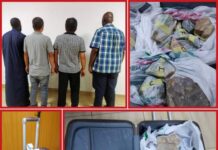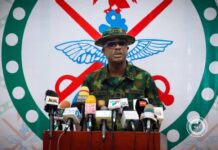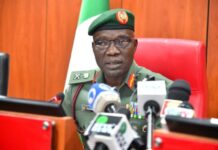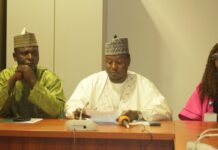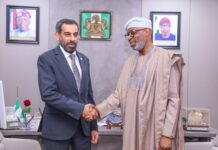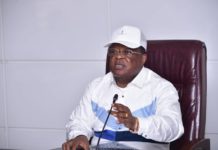The National Human Rights Commission has called on politicians, traditional and religious leaders and citizens to eschew hate speeches, incitement to violence and divisive rhetoric in this critical moment of the transition programme.
NHRC also urged the Independent National Electoral Commission (INEC) not to disenfranchise any electorate during the rescheduled election.
According to Ojukwu the NHRC will invoke its protective mandate to hold any Nigerian no matter his or her status in the society accountable for any violence or threat of violence that erupts as a result of their speeches, incitements and reckless statements.
He added that NHRC will continue to monitor the electoral process closely and provide further updates and issue its final statement on the conduct of the election in due course.
The call became imperative after complaints from the 36 states and FCT were logged into Human Rights Situation Room.
Addressing newsmen on Sunday in Abuja the executive secretary of the NHRC, Tony Ojukwu (SAN) said the reports from their monitors across the 36 states and the calls received in the Human Rights Situation Room revealed that INEC officials and electoral materials arrived late in many polling units causing delays in accreditation and voting in many polling units across the country. In 43% of over 1000 polling units monitored by NHRC monitors, counting of votes started late and in some places went on late into the night and even early on Sunday morning.
According to him, “The reports from our monitors across the 36 states and the calls received in the Human Rights Situation Room revealed that INEC officials and electoral materials arrived late in many polling units causing delays in accreditation and voting in many polling units across the country. In 43% of over 1000 polling units monitored by NHRC monitors, counting of votes started late and in some places went on late into the night and even early on Sunday morning.
“Our Monitors also noted that in some polling units, INEC officials did not come with essential electoral materials, including stamps and inks. In 5 polling units in Maiduguri, BVAS which is an essential element of the voting process was not available. 1.00pm – 2.00pm – 4%2.00pm – 3.00pm – 18%3.00pm – 4.00pm – 46%After 4.00pm – 34%3.3
“We notes with concern that INEC call lines and feedback platforms could not be reached at various attempts by our Monitors in spite of various attempts. Our monitors noted with satisfaction, the commendable turn-out of voters across the country,” he said
However, the ES noted that the ongoing election is a marked improvement from previous presidential and National Assembly elections in 2019, saying that the Commission commends Nigerians for their patriotism.
He said, ” We notes with regret, the disenfranchisement of Nigerians across Lagos, Bayelsa and Kogi states5.0 BVAS5.1.
“Our report shows 92% success with accreditation using the Bimodal Voter Accreditation System (BVAS). Just as in off cycle elections in the states, BVAS has shown. We however note the reported cases of inability or failure to upload election results at most of the polling units after counting, even in city centres like Abuja and Lagos.
Meanwhile NHRC supremo said, hhe NHRC monitors reported that the accreditation process was smooth. 92% of voters were successfully accredited while 8% were unsuccessful.
”Our monitors reported that the process of voting was challenging in some parts of the country due to the following factors: Upsurge in the number of voters without a corresponding increase in the number of polling personnel meant that the voting process is unduly prolonged and heightening vulnerabilities to electoral violence and malpractices.
Late arrival of personnel and materials meant that voting commenced late and voters and polling officials were exhausted.
“Our Human Rights Monitors also noted that the reassignment of polling units did not achieve its purpose as some Polling Units had just few voters and others had an upsurge of voters. Some of the voters who were reassigned to new polling units could not locate them on time and those who did could not access the new polling units due to distance and lack of transportation.
”Incidents of electoral violence were directly reported by our Monitors in 3% of the polling units observed across the country. In Kogi state, a party agent was allegedly shot by an opposition party thugs. In Lagos and Rivers states, there were reported incidents of ballot snatching and attacks on voters and INEC officials.
“There were various reports of attempts to intimidate voters and INEC officials by party supporters and thugs. These reports were received from states such as Rivers, Delta, Lagos, Kogi and Imo. NHRC monitors reported that in 8% of polling units, accreditation and voting were disrupted for various reasons, including the malfunctioning of election equipment and incidents of violence.
“Vote buying was reported in 42 locations across the country by our Human Rights Monitors, particularly in Lagos, Imo, Sokoto, Jigawa, Edo, Nasarawa, Jigawa and Kogi states. Voters were offered money or other incentives to influence their votes.
Law Enforcement Agents Generally, it was observed that the conduct of law enforcement and security personnel deployed to ensure a peaceful election was commendable.
However, the Commission notes:The inability of law enforcement and security agents to stop violence at polling units.Cases of human rights violations attributed to security agents including the use of force and extra-judicial killings.Crowd control: It was reported that in some polling units, the crowd was overwhelming and the security personnel were few in numbers
It will be recalled that the NHRC as part of its mandate to promote and protect human rights, launched its 2023 Election project “Mobilising Voters for Election (MOVE) late last year to ensure access, participation and accountability in the electoral process.Also, on February 25, 2023 the commission mobilised and deployed 800 Human Rights Monitors across the 36 states and the Federal Capital Territory to monitor the exercise of the right to vote and the level of access accorded to Nigerians to exercise these rights.
It also monitored the conduct of law enforcement and security personnel to note critical incidents relating to human rights violations occurring during and after the elections.
END










